Hospitality Industry Challenges and Trends
VerifiedAdded on 2020/06/06
|14
|4077
|82
AI Summary
This assignment delves into the multifaceted challenges and emerging trends shaping the modern hospitality industry. It examines issues such as corporate social responsibility, employee engagement, technological advancements, and evolving customer expectations. The analysis draws upon relevant academic research and real-world examples to provide a comprehensive understanding of the key factors influencing the future direction of the sector.
Contribute Materials
Your contribution can guide someone’s learning journey. Share your
documents today.
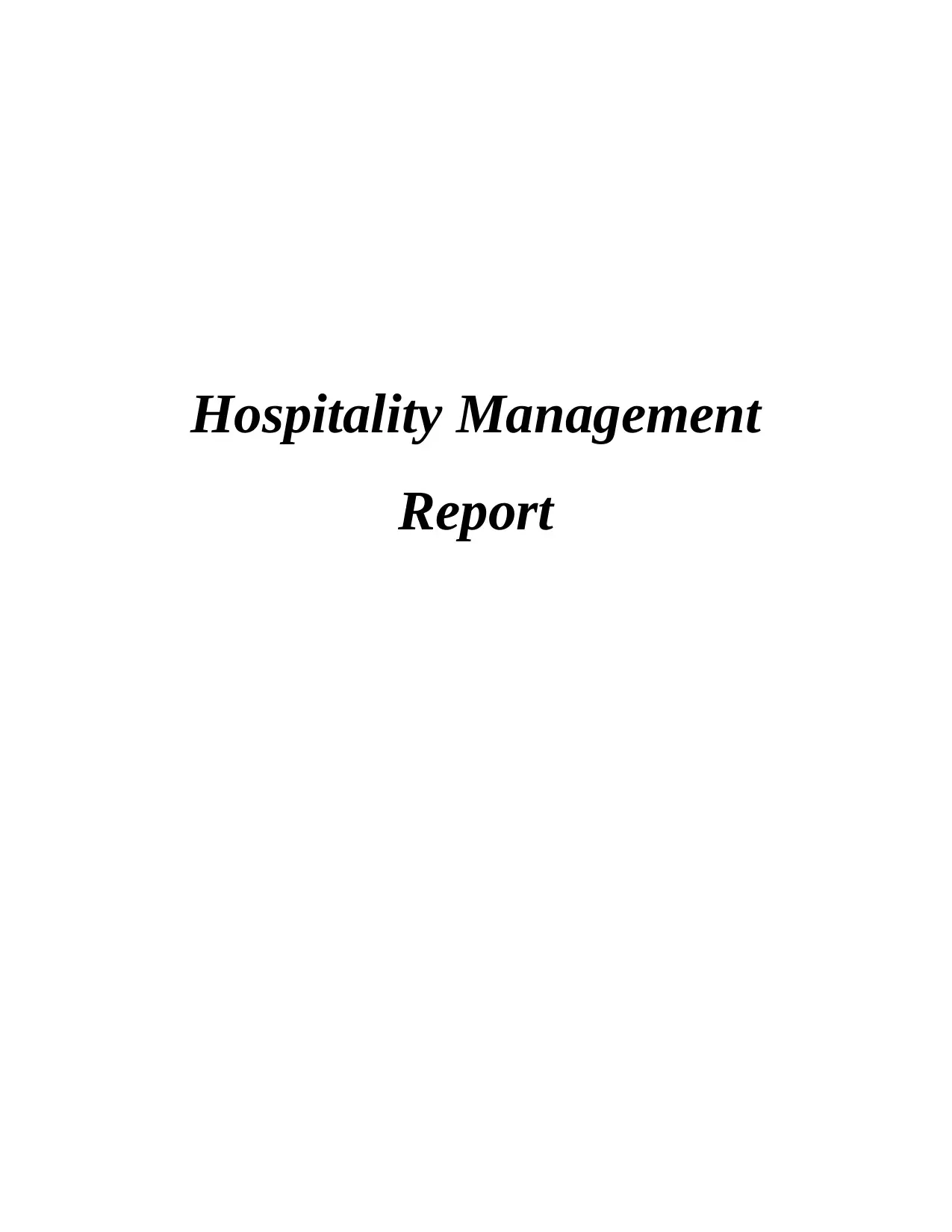
Hospitality Management
Report
Report
Secure Best Marks with AI Grader
Need help grading? Try our AI Grader for instant feedback on your assignments.
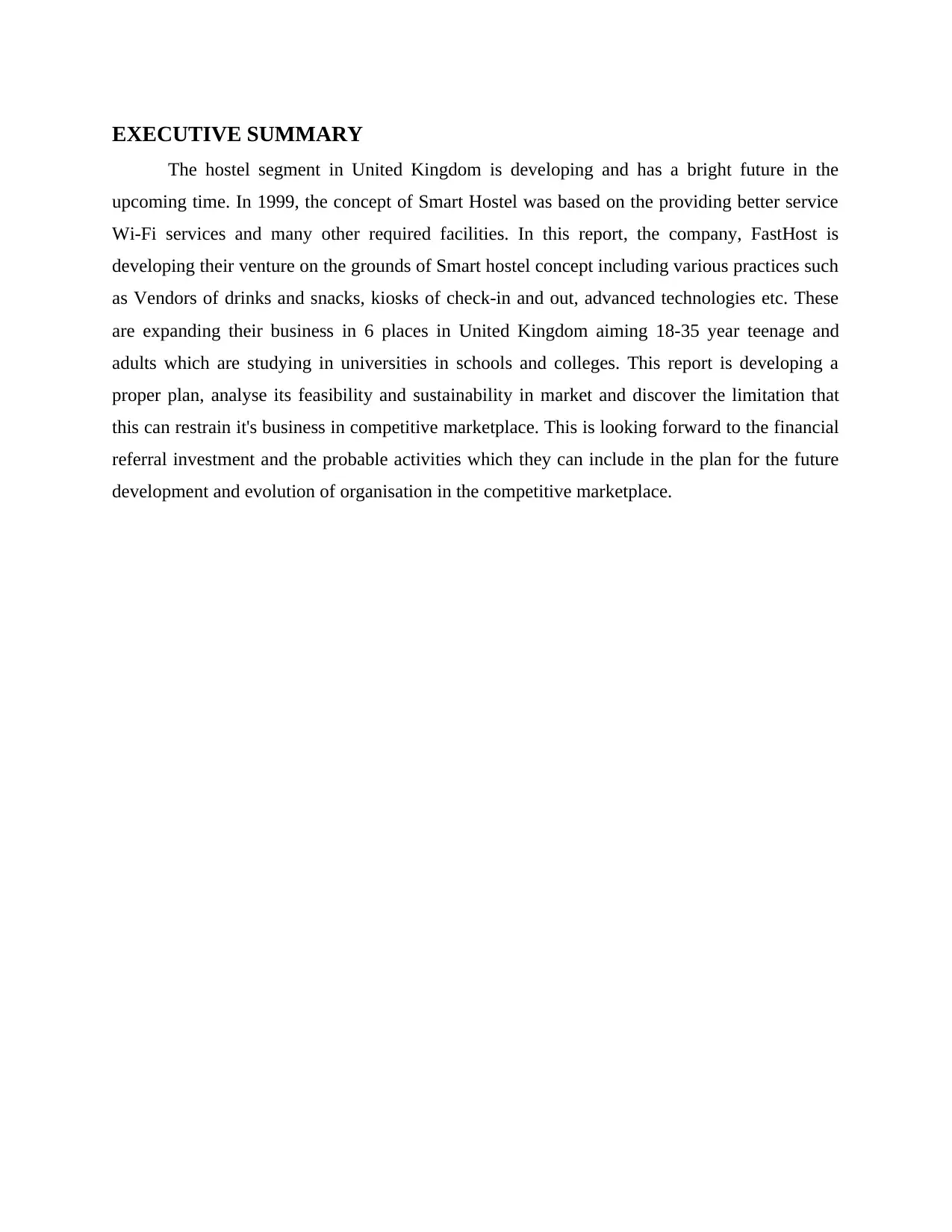
EXECUTIVE SUMMARY
The hostel segment in United Kingdom is developing and has a bright future in the
upcoming time. In 1999, the concept of Smart Hostel was based on the providing better service
Wi-Fi services and many other required facilities. In this report, the company, FastHost is
developing their venture on the grounds of Smart hostel concept including various practices such
as Vendors of drinks and snacks, kiosks of check-in and out, advanced technologies etc. These
are expanding their business in 6 places in United Kingdom aiming 18-35 year teenage and
adults which are studying in universities in schools and colleges. This report is developing a
proper plan, analyse its feasibility and sustainability in market and discover the limitation that
this can restrain it's business in competitive marketplace. This is looking forward to the financial
referral investment and the probable activities which they can include in the plan for the future
development and evolution of organisation in the competitive marketplace.
The hostel segment in United Kingdom is developing and has a bright future in the
upcoming time. In 1999, the concept of Smart Hostel was based on the providing better service
Wi-Fi services and many other required facilities. In this report, the company, FastHost is
developing their venture on the grounds of Smart hostel concept including various practices such
as Vendors of drinks and snacks, kiosks of check-in and out, advanced technologies etc. These
are expanding their business in 6 places in United Kingdom aiming 18-35 year teenage and
adults which are studying in universities in schools and colleges. This report is developing a
proper plan, analyse its feasibility and sustainability in market and discover the limitation that
this can restrain it's business in competitive marketplace. This is looking forward to the financial
referral investment and the probable activities which they can include in the plan for the future
development and evolution of organisation in the competitive marketplace.
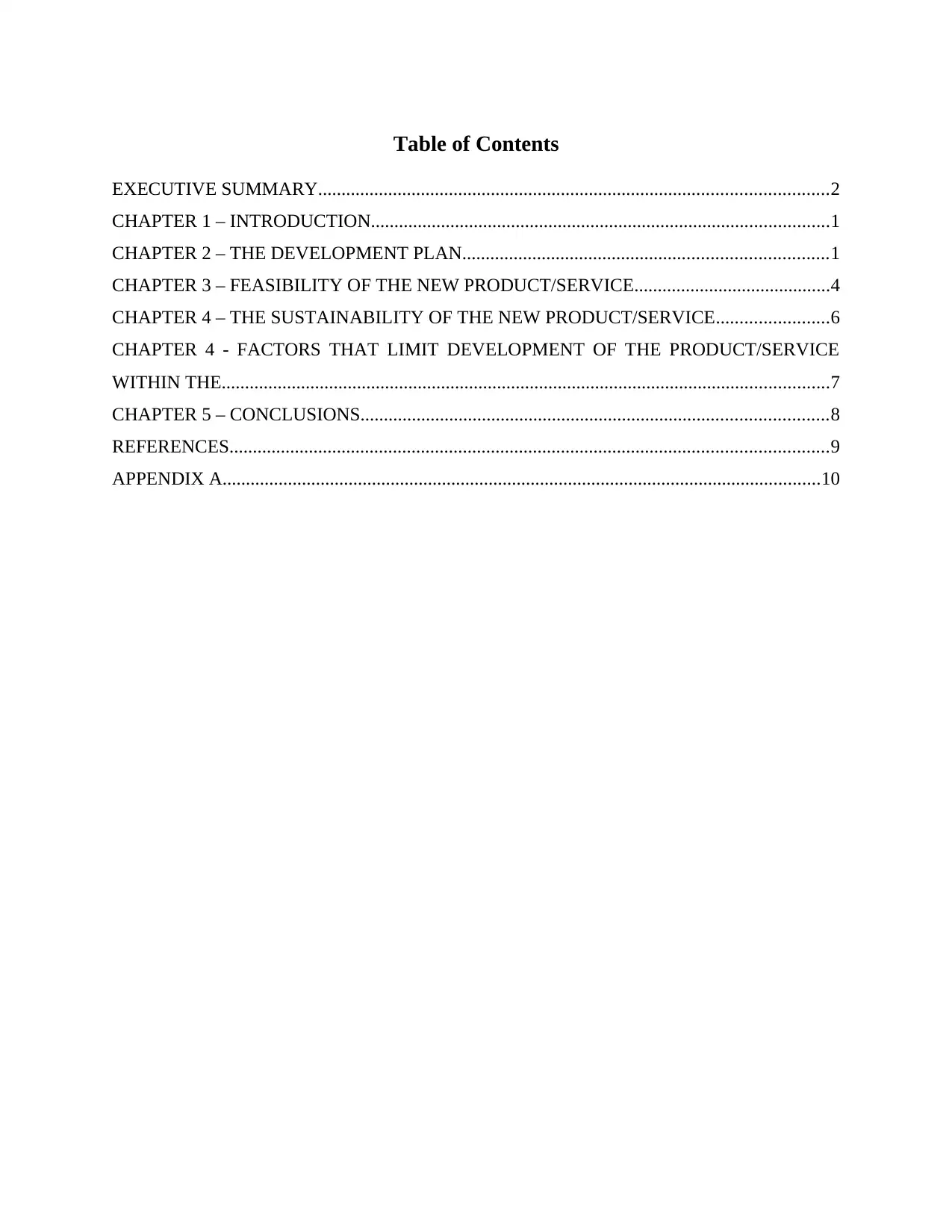
Table of Contents
EXECUTIVE SUMMARY.............................................................................................................2
CHAPTER 1 – INTRODUCTION..................................................................................................1
CHAPTER 2 – THE DEVELOPMENT PLAN..............................................................................1
CHAPTER 3 – FEASIBILITY OF THE NEW PRODUCT/SERVICE..........................................4
CHAPTER 4 – THE SUSTAINABILITY OF THE NEW PRODUCT/SERVICE........................6
CHAPTER 4 - FACTORS THAT LIMIT DEVELOPMENT OF THE PRODUCT/SERVICE
WITHIN THE..................................................................................................................................7
CHAPTER 5 – CONCLUSIONS....................................................................................................8
REFERENCES................................................................................................................................9
APPENDIX A................................................................................................................................10
EXECUTIVE SUMMARY.............................................................................................................2
CHAPTER 1 – INTRODUCTION..................................................................................................1
CHAPTER 2 – THE DEVELOPMENT PLAN..............................................................................1
CHAPTER 3 – FEASIBILITY OF THE NEW PRODUCT/SERVICE..........................................4
CHAPTER 4 – THE SUSTAINABILITY OF THE NEW PRODUCT/SERVICE........................6
CHAPTER 4 - FACTORS THAT LIMIT DEVELOPMENT OF THE PRODUCT/SERVICE
WITHIN THE..................................................................................................................................7
CHAPTER 5 – CONCLUSIONS....................................................................................................8
REFERENCES................................................................................................................................9
APPENDIX A................................................................................................................................10

Secure Best Marks with AI Grader
Need help grading? Try our AI Grader for instant feedback on your assignments.
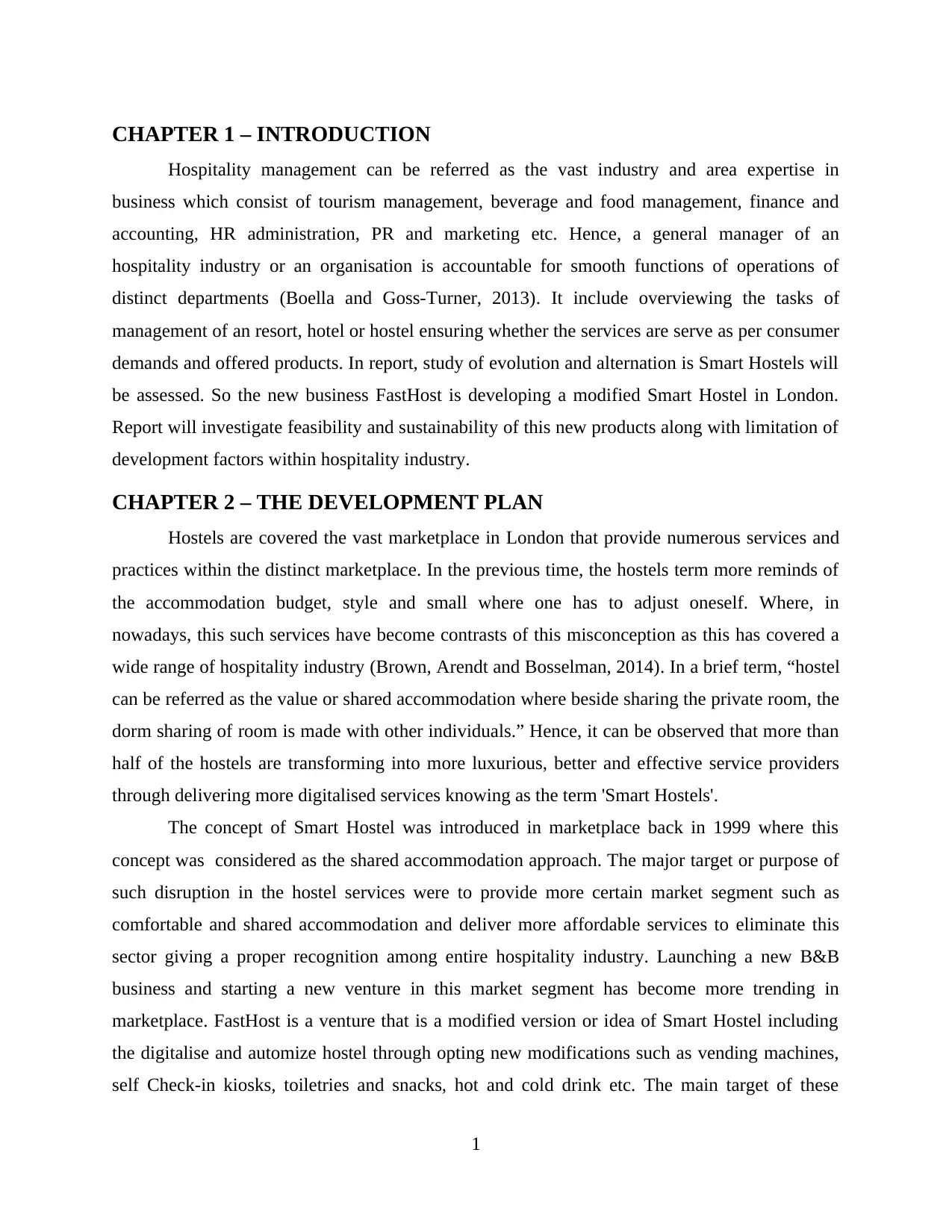
CHAPTER 1 – INTRODUCTION
Hospitality management can be referred as the vast industry and area expertise in
business which consist of tourism management, beverage and food management, finance and
accounting, HR administration, PR and marketing etc. Hence, a general manager of an
hospitality industry or an organisation is accountable for smooth functions of operations of
distinct departments (Boella and Goss-Turner, 2013). It include overviewing the tasks of
management of an resort, hotel or hostel ensuring whether the services are serve as per consumer
demands and offered products. In report, study of evolution and alternation is Smart Hostels will
be assessed. So the new business FastHost is developing a modified Smart Hostel in London.
Report will investigate feasibility and sustainability of this new products along with limitation of
development factors within hospitality industry.
CHAPTER 2 – THE DEVELOPMENT PLAN
Hostels are covered the vast marketplace in London that provide numerous services and
practices within the distinct marketplace. In the previous time, the hostels term more reminds of
the accommodation budget, style and small where one has to adjust oneself. Where, in
nowadays, this such services have become contrasts of this misconception as this has covered a
wide range of hospitality industry (Brown, Arendt and Bosselman, 2014). In a brief term, “hostel
can be referred as the value or shared accommodation where beside sharing the private room, the
dorm sharing of room is made with other individuals.” Hence, it can be observed that more than
half of the hostels are transforming into more luxurious, better and effective service providers
through delivering more digitalised services knowing as the term 'Smart Hostels'.
The concept of Smart Hostel was introduced in marketplace back in 1999 where this
concept was considered as the shared accommodation approach. The major target or purpose of
such disruption in the hostel services were to provide more certain market segment such as
comfortable and shared accommodation and deliver more affordable services to eliminate this
sector giving a proper recognition among entire hospitality industry. Launching a new B&B
business and starting a new venture in this market segment has become more trending in
marketplace. FastHost is a venture that is a modified version or idea of Smart Hostel including
the digitalise and automize hostel through opting new modifications such as vending machines,
self Check-in kiosks, toiletries and snacks, hot and cold drink etc. The main target of these
1
Hospitality management can be referred as the vast industry and area expertise in
business which consist of tourism management, beverage and food management, finance and
accounting, HR administration, PR and marketing etc. Hence, a general manager of an
hospitality industry or an organisation is accountable for smooth functions of operations of
distinct departments (Boella and Goss-Turner, 2013). It include overviewing the tasks of
management of an resort, hotel or hostel ensuring whether the services are serve as per consumer
demands and offered products. In report, study of evolution and alternation is Smart Hostels will
be assessed. So the new business FastHost is developing a modified Smart Hostel in London.
Report will investigate feasibility and sustainability of this new products along with limitation of
development factors within hospitality industry.
CHAPTER 2 – THE DEVELOPMENT PLAN
Hostels are covered the vast marketplace in London that provide numerous services and
practices within the distinct marketplace. In the previous time, the hostels term more reminds of
the accommodation budget, style and small where one has to adjust oneself. Where, in
nowadays, this such services have become contrasts of this misconception as this has covered a
wide range of hospitality industry (Brown, Arendt and Bosselman, 2014). In a brief term, “hostel
can be referred as the value or shared accommodation where beside sharing the private room, the
dorm sharing of room is made with other individuals.” Hence, it can be observed that more than
half of the hostels are transforming into more luxurious, better and effective service providers
through delivering more digitalised services knowing as the term 'Smart Hostels'.
The concept of Smart Hostel was introduced in marketplace back in 1999 where this
concept was considered as the shared accommodation approach. The major target or purpose of
such disruption in the hostel services were to provide more certain market segment such as
comfortable and shared accommodation and deliver more affordable services to eliminate this
sector giving a proper recognition among entire hospitality industry. Launching a new B&B
business and starting a new venture in this market segment has become more trending in
marketplace. FastHost is a venture that is a modified version or idea of Smart Hostel including
the digitalise and automize hostel through opting new modifications such as vending machines,
self Check-in kiosks, toiletries and snacks, hot and cold drink etc. The main target of these
1
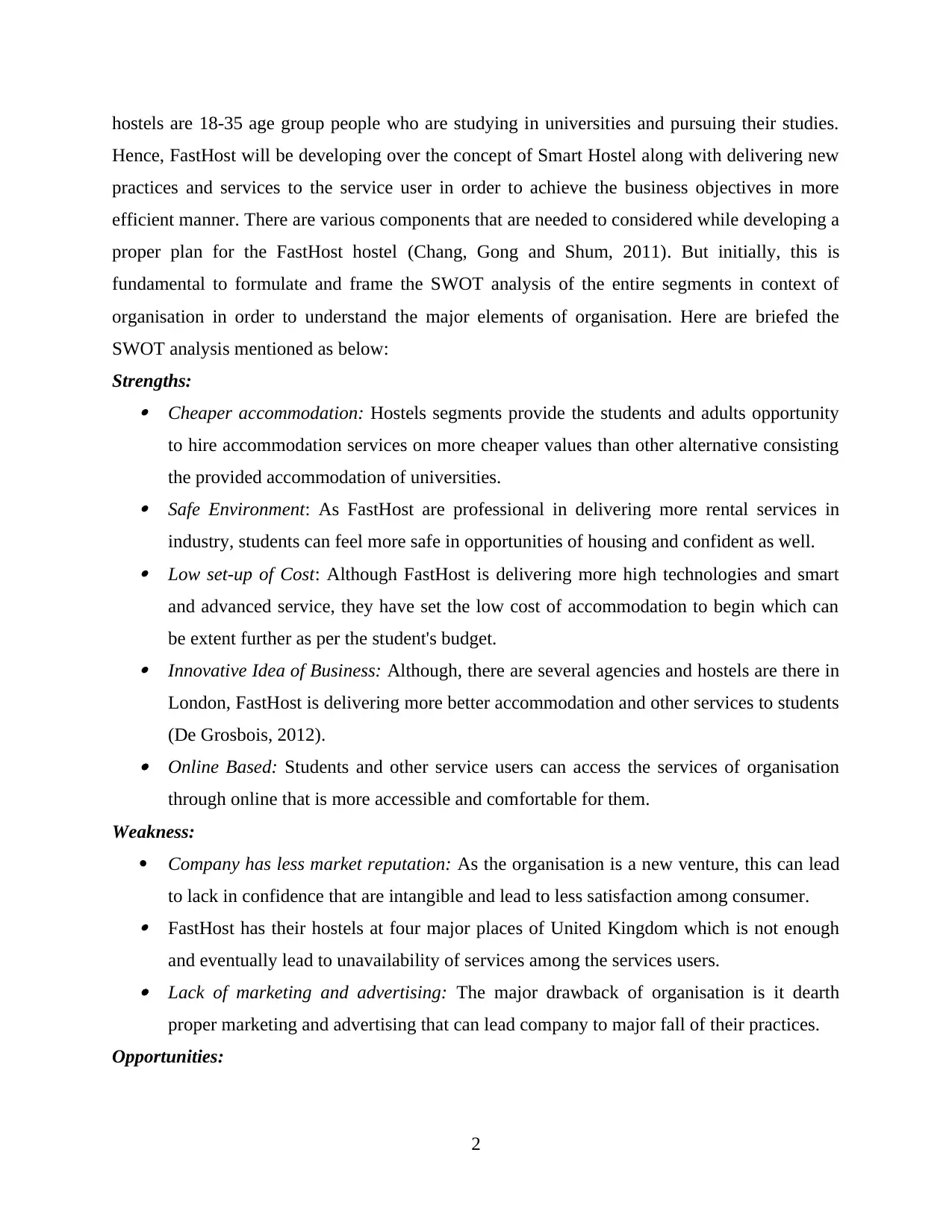
hostels are 18-35 age group people who are studying in universities and pursuing their studies.
Hence, FastHost will be developing over the concept of Smart Hostel along with delivering new
practices and services to the service user in order to achieve the business objectives in more
efficient manner. There are various components that are needed to considered while developing a
proper plan for the FastHost hostel (Chang, Gong and Shum, 2011). But initially, this is
fundamental to formulate and frame the SWOT analysis of the entire segments in context of
organisation in order to understand the major elements of organisation. Here are briefed the
SWOT analysis mentioned as below:
Strengths: Cheaper accommodation: Hostels segments provide the students and adults opportunity
to hire accommodation services on more cheaper values than other alternative consisting
the provided accommodation of universities. Safe Environment: As FastHost are professional in delivering more rental services in
industry, students can feel more safe in opportunities of housing and confident as well. Low set-up of Cost: Although FastHost is delivering more high technologies and smart
and advanced service, they have set the low cost of accommodation to begin which can
be extent further as per the student's budget. Innovative Idea of Business: Although, there are several agencies and hostels are there in
London, FastHost is delivering more better accommodation and other services to students
(De Grosbois, 2012). Online Based: Students and other service users can access the services of organisation
through online that is more accessible and comfortable for them.
Weakness:
Company has less market reputation: As the organisation is a new venture, this can lead
to lack in confidence that are intangible and lead to less satisfaction among consumer. FastHost has their hostels at four major places of United Kingdom which is not enough
and eventually lead to unavailability of services among the services users. Lack of marketing and advertising: The major drawback of organisation is it dearth
proper marketing and advertising that can lead company to major fall of their practices.
Opportunities:
2
Hence, FastHost will be developing over the concept of Smart Hostel along with delivering new
practices and services to the service user in order to achieve the business objectives in more
efficient manner. There are various components that are needed to considered while developing a
proper plan for the FastHost hostel (Chang, Gong and Shum, 2011). But initially, this is
fundamental to formulate and frame the SWOT analysis of the entire segments in context of
organisation in order to understand the major elements of organisation. Here are briefed the
SWOT analysis mentioned as below:
Strengths: Cheaper accommodation: Hostels segments provide the students and adults opportunity
to hire accommodation services on more cheaper values than other alternative consisting
the provided accommodation of universities. Safe Environment: As FastHost are professional in delivering more rental services in
industry, students can feel more safe in opportunities of housing and confident as well. Low set-up of Cost: Although FastHost is delivering more high technologies and smart
and advanced service, they have set the low cost of accommodation to begin which can
be extent further as per the student's budget. Innovative Idea of Business: Although, there are several agencies and hostels are there in
London, FastHost is delivering more better accommodation and other services to students
(De Grosbois, 2012). Online Based: Students and other service users can access the services of organisation
through online that is more accessible and comfortable for them.
Weakness:
Company has less market reputation: As the organisation is a new venture, this can lead
to lack in confidence that are intangible and lead to less satisfaction among consumer. FastHost has their hostels at four major places of United Kingdom which is not enough
and eventually lead to unavailability of services among the services users. Lack of marketing and advertising: The major drawback of organisation is it dearth
proper marketing and advertising that can lead company to major fall of their practices.
Opportunities:
2
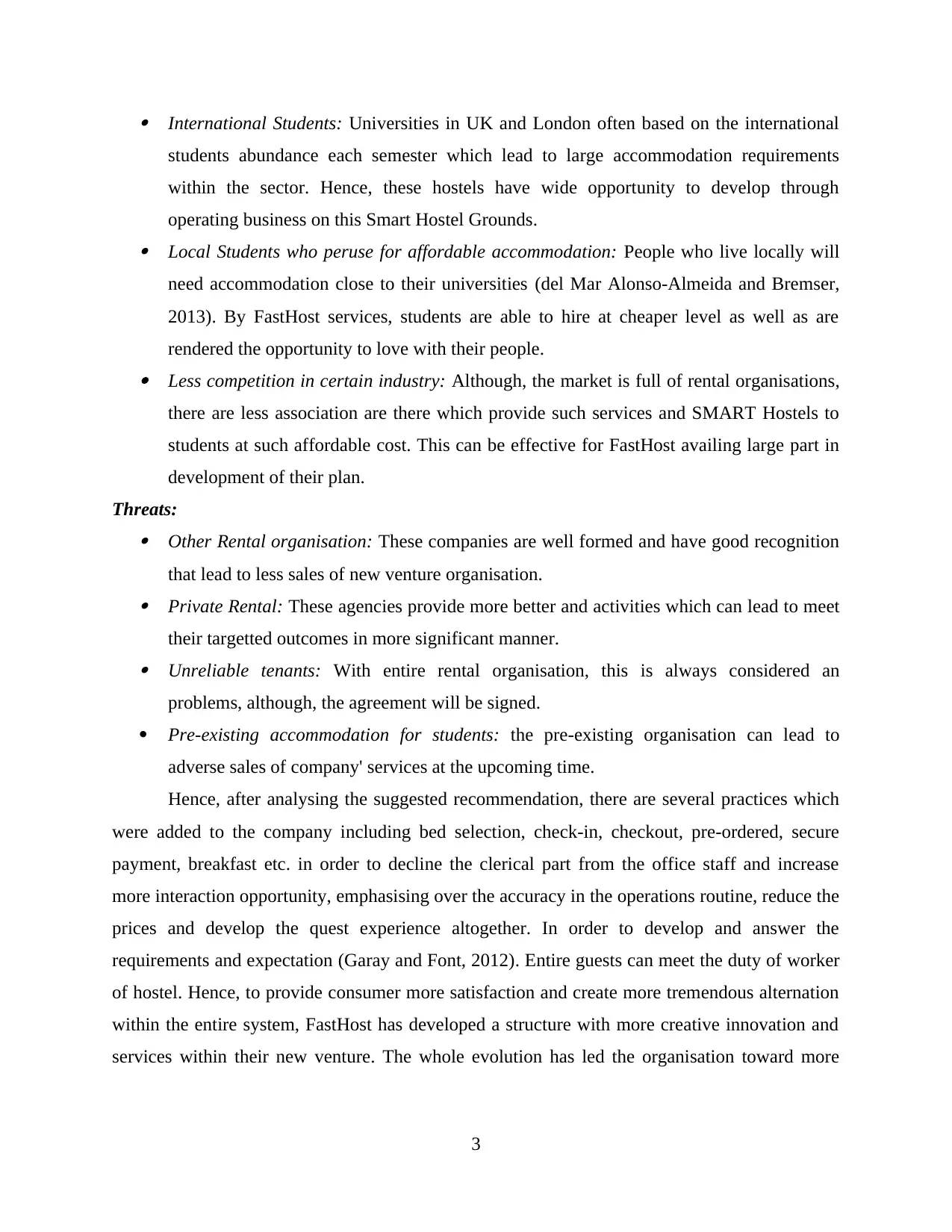
International Students: Universities in UK and London often based on the international
students abundance each semester which lead to large accommodation requirements
within the sector. Hence, these hostels have wide opportunity to develop through
operating business on this Smart Hostel Grounds. Local Students who peruse for affordable accommodation: People who live locally will
need accommodation close to their universities (del Mar Alonso-Almeida and Bremser,
2013). By FastHost services, students are able to hire at cheaper level as well as are
rendered the opportunity to love with their people. Less competition in certain industry: Although, the market is full of rental organisations,
there are less association are there which provide such services and SMART Hostels to
students at such affordable cost. This can be effective for FastHost availing large part in
development of their plan.
Threats: Other Rental organisation: These companies are well formed and have good recognition
that lead to less sales of new venture organisation. Private Rental: These agencies provide more better and activities which can lead to meet
their targetted outcomes in more significant manner. Unreliable tenants: With entire rental organisation, this is always considered an
problems, although, the agreement will be signed.
Pre-existing accommodation for students: the pre-existing organisation can lead to
adverse sales of company' services at the upcoming time.
Hence, after analysing the suggested recommendation, there are several practices which
were added to the company including bed selection, check-in, checkout, pre-ordered, secure
payment, breakfast etc. in order to decline the clerical part from the office staff and increase
more interaction opportunity, emphasising over the accuracy in the operations routine, reduce the
prices and develop the quest experience altogether. In order to develop and answer the
requirements and expectation (Garay and Font, 2012). Entire guests can meet the duty of worker
of hostel. Hence, to provide consumer more satisfaction and create more tremendous alternation
within the entire system, FastHost has developed a structure with more creative innovation and
services within their new venture. The whole evolution has led the organisation toward more
3
students abundance each semester which lead to large accommodation requirements
within the sector. Hence, these hostels have wide opportunity to develop through
operating business on this Smart Hostel Grounds. Local Students who peruse for affordable accommodation: People who live locally will
need accommodation close to their universities (del Mar Alonso-Almeida and Bremser,
2013). By FastHost services, students are able to hire at cheaper level as well as are
rendered the opportunity to love with their people. Less competition in certain industry: Although, the market is full of rental organisations,
there are less association are there which provide such services and SMART Hostels to
students at such affordable cost. This can be effective for FastHost availing large part in
development of their plan.
Threats: Other Rental organisation: These companies are well formed and have good recognition
that lead to less sales of new venture organisation. Private Rental: These agencies provide more better and activities which can lead to meet
their targetted outcomes in more significant manner. Unreliable tenants: With entire rental organisation, this is always considered an
problems, although, the agreement will be signed.
Pre-existing accommodation for students: the pre-existing organisation can lead to
adverse sales of company' services at the upcoming time.
Hence, after analysing the suggested recommendation, there are several practices which
were added to the company including bed selection, check-in, checkout, pre-ordered, secure
payment, breakfast etc. in order to decline the clerical part from the office staff and increase
more interaction opportunity, emphasising over the accuracy in the operations routine, reduce the
prices and develop the quest experience altogether. In order to develop and answer the
requirements and expectation (Garay and Font, 2012). Entire guests can meet the duty of worker
of hostel. Hence, to provide consumer more satisfaction and create more tremendous alternation
within the entire system, FastHost has developed a structure with more creative innovation and
services within their new venture. The whole evolution has led the organisation toward more
3
Paraphrase This Document
Need a fresh take? Get an instant paraphrase of this document with our AI Paraphraser
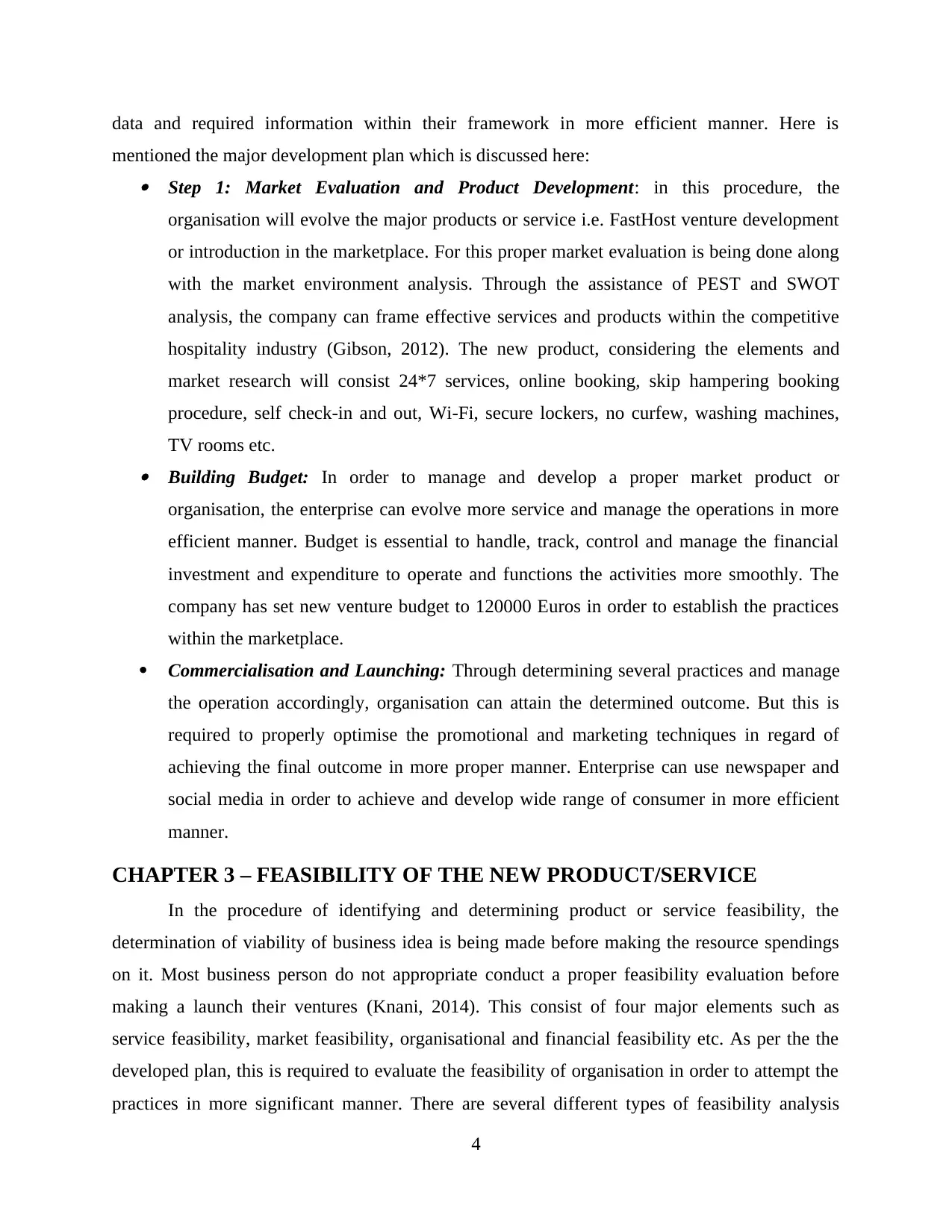
data and required information within their framework in more efficient manner. Here is
mentioned the major development plan which is discussed here: Step 1: Market Evaluation and Product Development: in this procedure, the
organisation will evolve the major products or service i.e. FastHost venture development
or introduction in the marketplace. For this proper market evaluation is being done along
with the market environment analysis. Through the assistance of PEST and SWOT
analysis, the company can frame effective services and products within the competitive
hospitality industry (Gibson, 2012). The new product, considering the elements and
market research will consist 24*7 services, online booking, skip hampering booking
procedure, self check-in and out, Wi-Fi, secure lockers, no curfew, washing machines,
TV rooms etc. Building Budget: In order to manage and develop a proper market product or
organisation, the enterprise can evolve more service and manage the operations in more
efficient manner. Budget is essential to handle, track, control and manage the financial
investment and expenditure to operate and functions the activities more smoothly. The
company has set new venture budget to 120000 Euros in order to establish the practices
within the marketplace.
Commercialisation and Launching: Through determining several practices and manage
the operation accordingly, organisation can attain the determined outcome. But this is
required to properly optimise the promotional and marketing techniques in regard of
achieving the final outcome in more proper manner. Enterprise can use newspaper and
social media in order to achieve and develop wide range of consumer in more efficient
manner.
CHAPTER 3 – FEASIBILITY OF THE NEW PRODUCT/SERVICE
In the procedure of identifying and determining product or service feasibility, the
determination of viability of business idea is being made before making the resource spendings
on it. Most business person do not appropriate conduct a proper feasibility evaluation before
making a launch their ventures (Knani, 2014). This consist of four major elements such as
service feasibility, market feasibility, organisational and financial feasibility etc. As per the the
developed plan, this is required to evaluate the feasibility of organisation in order to attempt the
practices in more significant manner. There are several different types of feasibility analysis
4
mentioned the major development plan which is discussed here: Step 1: Market Evaluation and Product Development: in this procedure, the
organisation will evolve the major products or service i.e. FastHost venture development
or introduction in the marketplace. For this proper market evaluation is being done along
with the market environment analysis. Through the assistance of PEST and SWOT
analysis, the company can frame effective services and products within the competitive
hospitality industry (Gibson, 2012). The new product, considering the elements and
market research will consist 24*7 services, online booking, skip hampering booking
procedure, self check-in and out, Wi-Fi, secure lockers, no curfew, washing machines,
TV rooms etc. Building Budget: In order to manage and develop a proper market product or
organisation, the enterprise can evolve more service and manage the operations in more
efficient manner. Budget is essential to handle, track, control and manage the financial
investment and expenditure to operate and functions the activities more smoothly. The
company has set new venture budget to 120000 Euros in order to establish the practices
within the marketplace.
Commercialisation and Launching: Through determining several practices and manage
the operation accordingly, organisation can attain the determined outcome. But this is
required to properly optimise the promotional and marketing techniques in regard of
achieving the final outcome in more proper manner. Enterprise can use newspaper and
social media in order to achieve and develop wide range of consumer in more efficient
manner.
CHAPTER 3 – FEASIBILITY OF THE NEW PRODUCT/SERVICE
In the procedure of identifying and determining product or service feasibility, the
determination of viability of business idea is being made before making the resource spendings
on it. Most business person do not appropriate conduct a proper feasibility evaluation before
making a launch their ventures (Knani, 2014). This consist of four major elements such as
service feasibility, market feasibility, organisational and financial feasibility etc. As per the the
developed plan, this is required to evaluate the feasibility of organisation in order to attempt the
practices in more significant manner. There are several different types of feasibility analysis
4
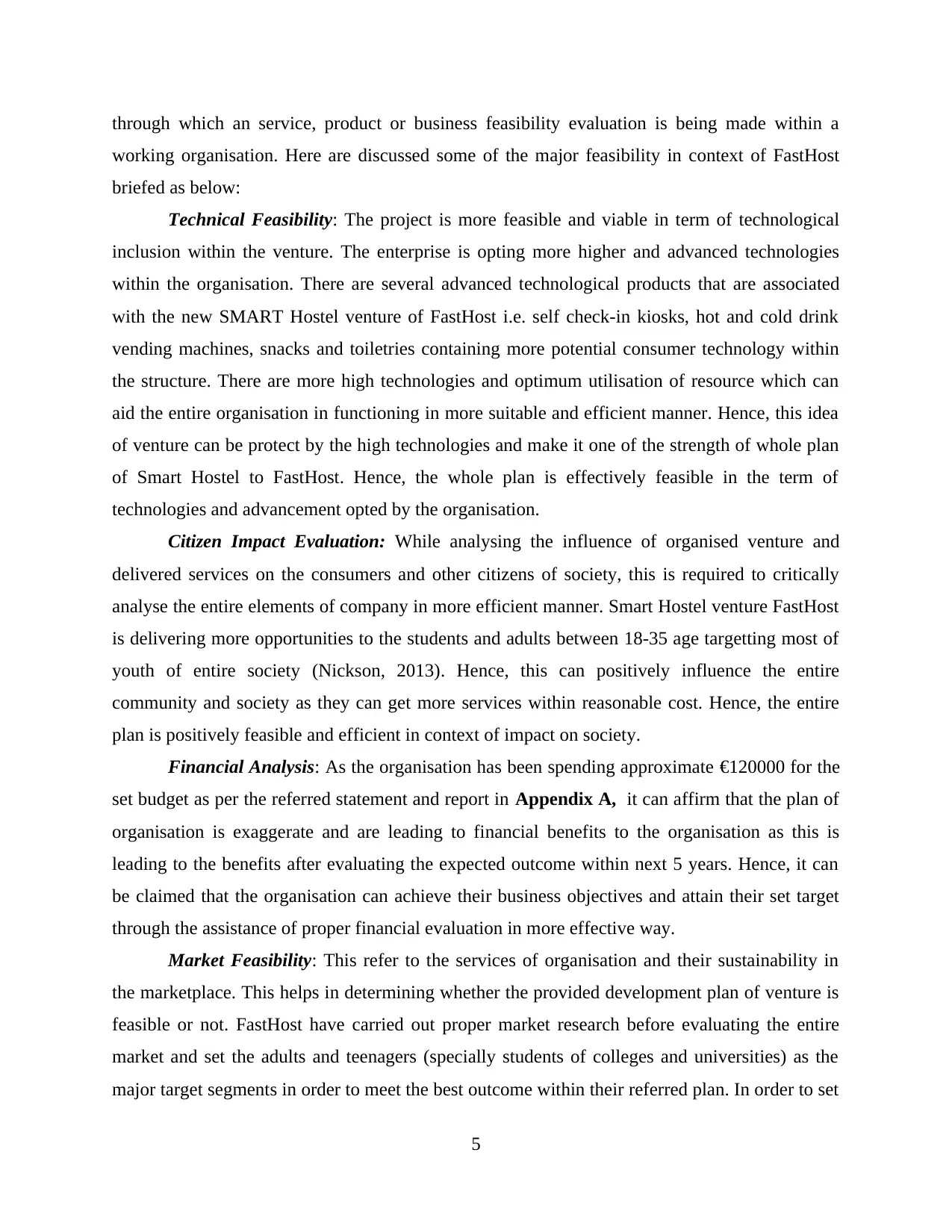
through which an service, product or business feasibility evaluation is being made within a
working organisation. Here are discussed some of the major feasibility in context of FastHost
briefed as below:
Technical Feasibility: The project is more feasible and viable in term of technological
inclusion within the venture. The enterprise is opting more higher and advanced technologies
within the organisation. There are several advanced technological products that are associated
with the new SMART Hostel venture of FastHost i.e. self check-in kiosks, hot and cold drink
vending machines, snacks and toiletries containing more potential consumer technology within
the structure. There are more high technologies and optimum utilisation of resource which can
aid the entire organisation in functioning in more suitable and efficient manner. Hence, this idea
of venture can be protect by the high technologies and make it one of the strength of whole plan
of Smart Hostel to FastHost. Hence, the whole plan is effectively feasible in the term of
technologies and advancement opted by the organisation.
Citizen Impact Evaluation: While analysing the influence of organised venture and
delivered services on the consumers and other citizens of society, this is required to critically
analyse the entire elements of company in more efficient manner. Smart Hostel venture FastHost
is delivering more opportunities to the students and adults between 18-35 age targetting most of
youth of entire society (Nickson, 2013). Hence, this can positively influence the entire
community and society as they can get more services within reasonable cost. Hence, the entire
plan is positively feasible and efficient in context of impact on society.
Financial Analysis: As the organisation has been spending approximate €120000 for the
set budget as per the referred statement and report in Appendix A, it can affirm that the plan of
organisation is exaggerate and are leading to financial benefits to the organisation as this is
leading to the benefits after evaluating the expected outcome within next 5 years. Hence, it can
be claimed that the organisation can achieve their business objectives and attain their set target
through the assistance of proper financial evaluation in more effective way.
Market Feasibility: This refer to the services of organisation and their sustainability in
the marketplace. This helps in determining whether the provided development plan of venture is
feasible or not. FastHost have carried out proper market research before evaluating the entire
market and set the adults and teenagers (specially students of colleges and universities) as the
major target segments in order to meet the best outcome within their referred plan. In order to set
5
working organisation. Here are discussed some of the major feasibility in context of FastHost
briefed as below:
Technical Feasibility: The project is more feasible and viable in term of technological
inclusion within the venture. The enterprise is opting more higher and advanced technologies
within the organisation. There are several advanced technological products that are associated
with the new SMART Hostel venture of FastHost i.e. self check-in kiosks, hot and cold drink
vending machines, snacks and toiletries containing more potential consumer technology within
the structure. There are more high technologies and optimum utilisation of resource which can
aid the entire organisation in functioning in more suitable and efficient manner. Hence, this idea
of venture can be protect by the high technologies and make it one of the strength of whole plan
of Smart Hostel to FastHost. Hence, the whole plan is effectively feasible in the term of
technologies and advancement opted by the organisation.
Citizen Impact Evaluation: While analysing the influence of organised venture and
delivered services on the consumers and other citizens of society, this is required to critically
analyse the entire elements of company in more efficient manner. Smart Hostel venture FastHost
is delivering more opportunities to the students and adults between 18-35 age targetting most of
youth of entire society (Nickson, 2013). Hence, this can positively influence the entire
community and society as they can get more services within reasonable cost. Hence, the entire
plan is positively feasible and efficient in context of impact on society.
Financial Analysis: As the organisation has been spending approximate €120000 for the
set budget as per the referred statement and report in Appendix A, it can affirm that the plan of
organisation is exaggerate and are leading to financial benefits to the organisation as this is
leading to the benefits after evaluating the expected outcome within next 5 years. Hence, it can
be claimed that the organisation can achieve their business objectives and attain their set target
through the assistance of proper financial evaluation in more effective way.
Market Feasibility: This refer to the services of organisation and their sustainability in
the marketplace. This helps in determining whether the provided development plan of venture is
feasible or not. FastHost have carried out proper market research before evaluating the entire
market and set the adults and teenagers (specially students of colleges and universities) as the
major target segments in order to meet the best outcome within their referred plan. In order to set
5
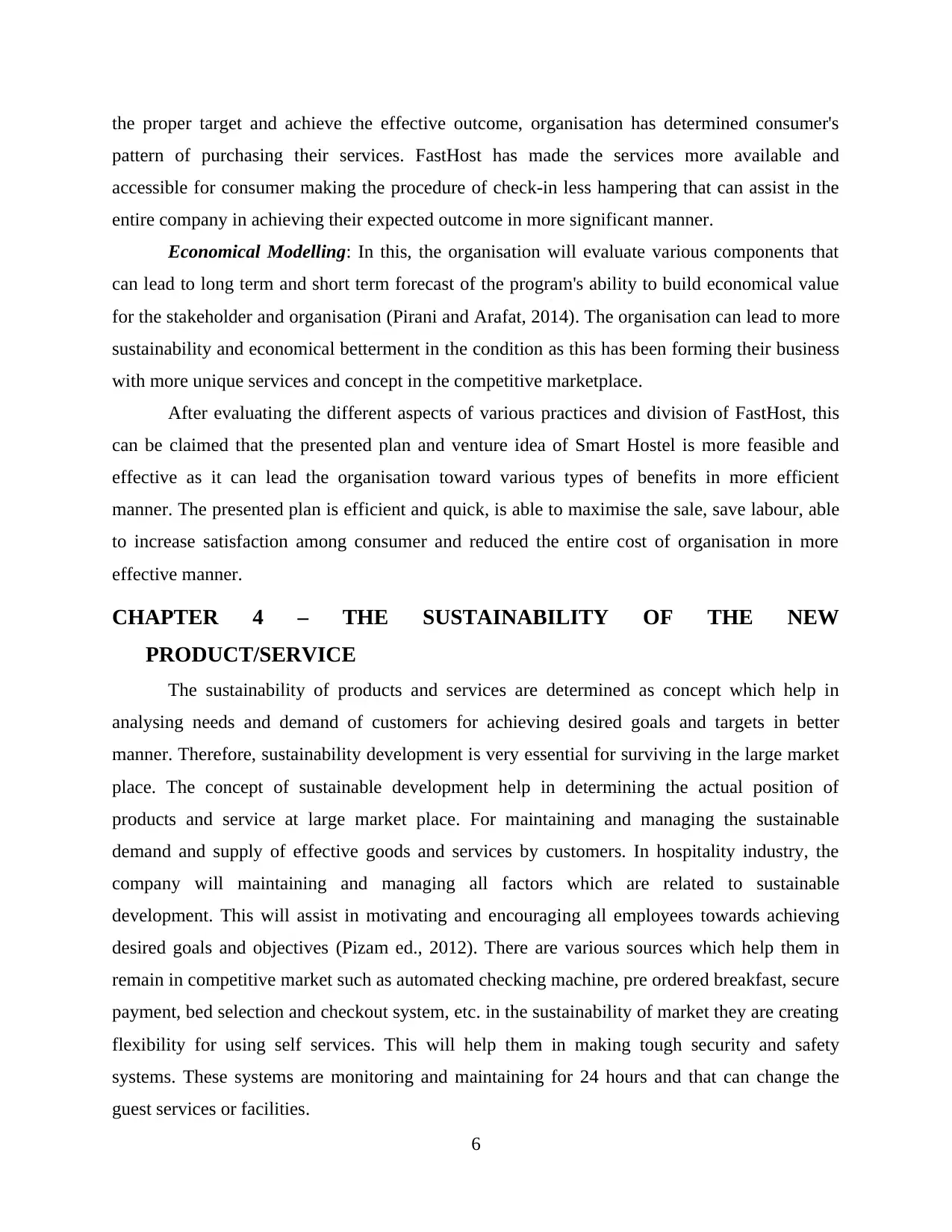
the proper target and achieve the effective outcome, organisation has determined consumer's
pattern of purchasing their services. FastHost has made the services more available and
accessible for consumer making the procedure of check-in less hampering that can assist in the
entire company in achieving their expected outcome in more significant manner.
Economical Modelling: In this, the organisation will evaluate various components that
can lead to long term and short term forecast of the program's ability to build economical value
for the stakeholder and organisation (Pirani and Arafat, 2014). The organisation can lead to more
sustainability and economical betterment in the condition as this has been forming their business
with more unique services and concept in the competitive marketplace.
After evaluating the different aspects of various practices and division of FastHost, this
can be claimed that the presented plan and venture idea of Smart Hostel is more feasible and
effective as it can lead the organisation toward various types of benefits in more efficient
manner. The presented plan is efficient and quick, is able to maximise the sale, save labour, able
to increase satisfaction among consumer and reduced the entire cost of organisation in more
effective manner.
CHAPTER 4 – THE SUSTAINABILITY OF THE NEW
PRODUCT/SERVICE
The sustainability of products and services are determined as concept which help in
analysing needs and demand of customers for achieving desired goals and targets in better
manner. Therefore, sustainability development is very essential for surviving in the large market
place. The concept of sustainable development help in determining the actual position of
products and service at large market place. For maintaining and managing the sustainable
demand and supply of effective goods and services by customers. In hospitality industry, the
company will maintaining and managing all factors which are related to sustainable
development. This will assist in motivating and encouraging all employees towards achieving
desired goals and objectives (Pizam ed., 2012). There are various sources which help them in
remain in competitive market such as automated checking machine, pre ordered breakfast, secure
payment, bed selection and checkout system, etc. in the sustainability of market they are creating
flexibility for using self services. This will help them in making tough security and safety
systems. These systems are monitoring and maintaining for 24 hours and that can change the
guest services or facilities.
6
pattern of purchasing their services. FastHost has made the services more available and
accessible for consumer making the procedure of check-in less hampering that can assist in the
entire company in achieving their expected outcome in more significant manner.
Economical Modelling: In this, the organisation will evaluate various components that
can lead to long term and short term forecast of the program's ability to build economical value
for the stakeholder and organisation (Pirani and Arafat, 2014). The organisation can lead to more
sustainability and economical betterment in the condition as this has been forming their business
with more unique services and concept in the competitive marketplace.
After evaluating the different aspects of various practices and division of FastHost, this
can be claimed that the presented plan and venture idea of Smart Hostel is more feasible and
effective as it can lead the organisation toward various types of benefits in more efficient
manner. The presented plan is efficient and quick, is able to maximise the sale, save labour, able
to increase satisfaction among consumer and reduced the entire cost of organisation in more
effective manner.
CHAPTER 4 – THE SUSTAINABILITY OF THE NEW
PRODUCT/SERVICE
The sustainability of products and services are determined as concept which help in
analysing needs and demand of customers for achieving desired goals and targets in better
manner. Therefore, sustainability development is very essential for surviving in the large market
place. The concept of sustainable development help in determining the actual position of
products and service at large market place. For maintaining and managing the sustainable
demand and supply of effective goods and services by customers. In hospitality industry, the
company will maintaining and managing all factors which are related to sustainable
development. This will assist in motivating and encouraging all employees towards achieving
desired goals and objectives (Pizam ed., 2012). There are various sources which help them in
remain in competitive market such as automated checking machine, pre ordered breakfast, secure
payment, bed selection and checkout system, etc. in the sustainability of market they are creating
flexibility for using self services. This will help them in making tough security and safety
systems. These systems are monitoring and maintaining for 24 hours and that can change the
guest services or facilities.
6
Secure Best Marks with AI Grader
Need help grading? Try our AI Grader for instant feedback on your assignments.
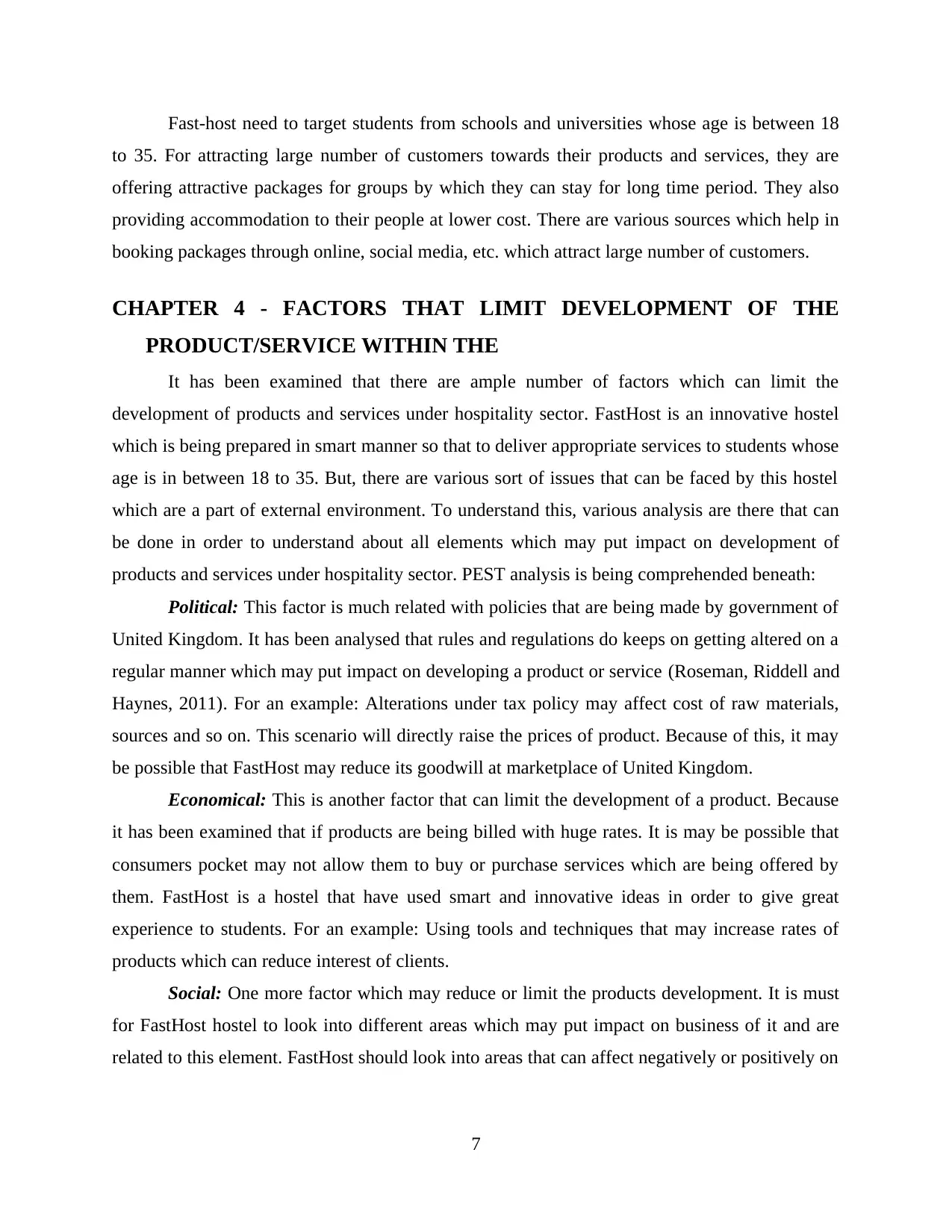
Fast-host need to target students from schools and universities whose age is between 18
to 35. For attracting large number of customers towards their products and services, they are
offering attractive packages for groups by which they can stay for long time period. They also
providing accommodation to their people at lower cost. There are various sources which help in
booking packages through online, social media, etc. which attract large number of customers.
CHAPTER 4 - FACTORS THAT LIMIT DEVELOPMENT OF THE
PRODUCT/SERVICE WITHIN THE
It has been examined that there are ample number of factors which can limit the
development of products and services under hospitality sector. FastHost is an innovative hostel
which is being prepared in smart manner so that to deliver appropriate services to students whose
age is in between 18 to 35. But, there are various sort of issues that can be faced by this hostel
which are a part of external environment. To understand this, various analysis are there that can
be done in order to understand about all elements which may put impact on development of
products and services under hospitality sector. PEST analysis is being comprehended beneath:
Political: This factor is much related with policies that are being made by government of
United Kingdom. It has been analysed that rules and regulations do keeps on getting altered on a
regular manner which may put impact on developing a product or service (Roseman, Riddell and
Haynes, 2011). For an example: Alterations under tax policy may affect cost of raw materials,
sources and so on. This scenario will directly raise the prices of product. Because of this, it may
be possible that FastHost may reduce its goodwill at marketplace of United Kingdom.
Economical: This is another factor that can limit the development of a product. Because
it has been examined that if products are being billed with huge rates. It is may be possible that
consumers pocket may not allow them to buy or purchase services which are being offered by
them. FastHost is a hostel that have used smart and innovative ideas in order to give great
experience to students. For an example: Using tools and techniques that may increase rates of
products which can reduce interest of clients.
Social: One more factor which may reduce or limit the products development. It is must
for FastHost hostel to look into different areas which may put impact on business of it and are
related to this element. FastHost should look into areas that can affect negatively or positively on
7
to 35. For attracting large number of customers towards their products and services, they are
offering attractive packages for groups by which they can stay for long time period. They also
providing accommodation to their people at lower cost. There are various sources which help in
booking packages through online, social media, etc. which attract large number of customers.
CHAPTER 4 - FACTORS THAT LIMIT DEVELOPMENT OF THE
PRODUCT/SERVICE WITHIN THE
It has been examined that there are ample number of factors which can limit the
development of products and services under hospitality sector. FastHost is an innovative hostel
which is being prepared in smart manner so that to deliver appropriate services to students whose
age is in between 18 to 35. But, there are various sort of issues that can be faced by this hostel
which are a part of external environment. To understand this, various analysis are there that can
be done in order to understand about all elements which may put impact on development of
products and services under hospitality sector. PEST analysis is being comprehended beneath:
Political: This factor is much related with policies that are being made by government of
United Kingdom. It has been analysed that rules and regulations do keeps on getting altered on a
regular manner which may put impact on developing a product or service (Roseman, Riddell and
Haynes, 2011). For an example: Alterations under tax policy may affect cost of raw materials,
sources and so on. This scenario will directly raise the prices of product. Because of this, it may
be possible that FastHost may reduce its goodwill at marketplace of United Kingdom.
Economical: This is another factor that can limit the development of a product. Because
it has been examined that if products are being billed with huge rates. It is may be possible that
consumers pocket may not allow them to buy or purchase services which are being offered by
them. FastHost is a hostel that have used smart and innovative ideas in order to give great
experience to students. For an example: Using tools and techniques that may increase rates of
products which can reduce interest of clients.
Social: One more factor which may reduce or limit the products development. It is must
for FastHost hostel to look into different areas which may put impact on business of it and are
related to this element. FastHost should look into areas that can affect negatively or positively on
7
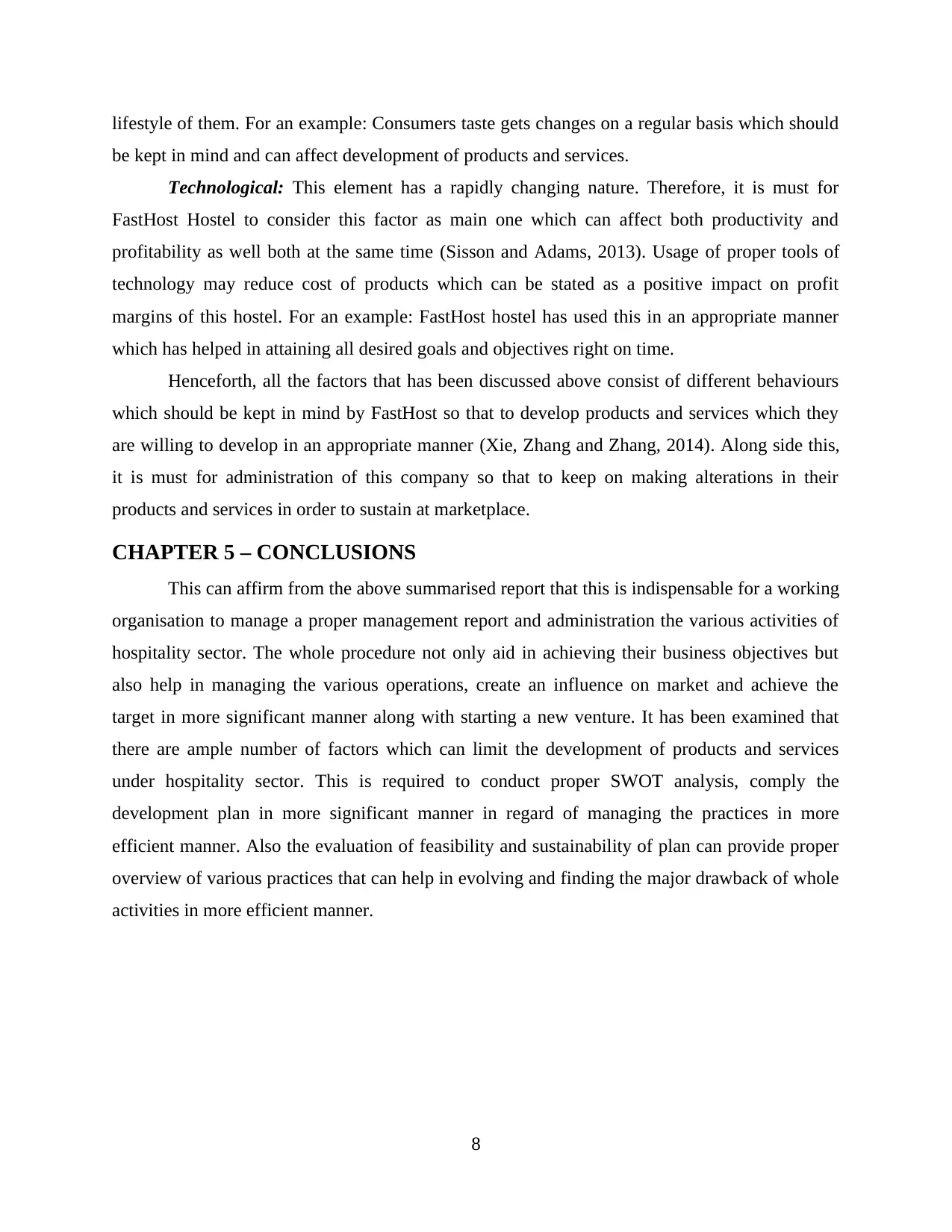
lifestyle of them. For an example: Consumers taste gets changes on a regular basis which should
be kept in mind and can affect development of products and services.
Technological: This element has a rapidly changing nature. Therefore, it is must for
FastHost Hostel to consider this factor as main one which can affect both productivity and
profitability as well both at the same time (Sisson and Adams, 2013). Usage of proper tools of
technology may reduce cost of products which can be stated as a positive impact on profit
margins of this hostel. For an example: FastHost hostel has used this in an appropriate manner
which has helped in attaining all desired goals and objectives right on time.
Henceforth, all the factors that has been discussed above consist of different behaviours
which should be kept in mind by FastHost so that to develop products and services which they
are willing to develop in an appropriate manner (Xie, Zhang and Zhang, 2014). Along side this,
it is must for administration of this company so that to keep on making alterations in their
products and services in order to sustain at marketplace.
CHAPTER 5 – CONCLUSIONS
This can affirm from the above summarised report that this is indispensable for a working
organisation to manage a proper management report and administration the various activities of
hospitality sector. The whole procedure not only aid in achieving their business objectives but
also help in managing the various operations, create an influence on market and achieve the
target in more significant manner along with starting a new venture. It has been examined that
there are ample number of factors which can limit the development of products and services
under hospitality sector. This is required to conduct proper SWOT analysis, comply the
development plan in more significant manner in regard of managing the practices in more
efficient manner. Also the evaluation of feasibility and sustainability of plan can provide proper
overview of various practices that can help in evolving and finding the major drawback of whole
activities in more efficient manner.
8
be kept in mind and can affect development of products and services.
Technological: This element has a rapidly changing nature. Therefore, it is must for
FastHost Hostel to consider this factor as main one which can affect both productivity and
profitability as well both at the same time (Sisson and Adams, 2013). Usage of proper tools of
technology may reduce cost of products which can be stated as a positive impact on profit
margins of this hostel. For an example: FastHost hostel has used this in an appropriate manner
which has helped in attaining all desired goals and objectives right on time.
Henceforth, all the factors that has been discussed above consist of different behaviours
which should be kept in mind by FastHost so that to develop products and services which they
are willing to develop in an appropriate manner (Xie, Zhang and Zhang, 2014). Along side this,
it is must for administration of this company so that to keep on making alterations in their
products and services in order to sustain at marketplace.
CHAPTER 5 – CONCLUSIONS
This can affirm from the above summarised report that this is indispensable for a working
organisation to manage a proper management report and administration the various activities of
hospitality sector. The whole procedure not only aid in achieving their business objectives but
also help in managing the various operations, create an influence on market and achieve the
target in more significant manner along with starting a new venture. It has been examined that
there are ample number of factors which can limit the development of products and services
under hospitality sector. This is required to conduct proper SWOT analysis, comply the
development plan in more significant manner in regard of managing the practices in more
efficient manner. Also the evaluation of feasibility and sustainability of plan can provide proper
overview of various practices that can help in evolving and finding the major drawback of whole
activities in more efficient manner.
8
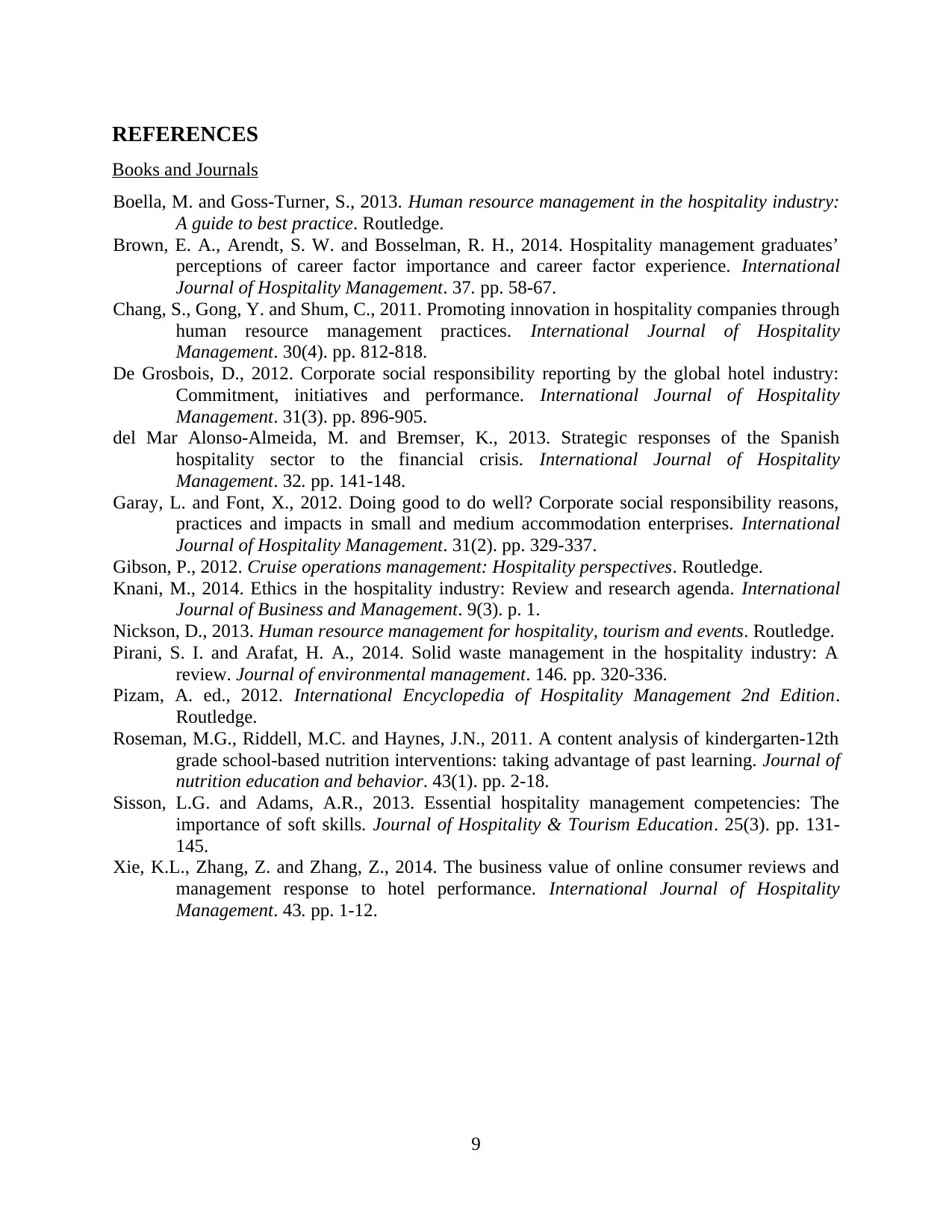
REFERENCES
Books and Journals
Boella, M. and Goss-Turner, S., 2013. Human resource management in the hospitality industry:
A guide to best practice. Routledge.
Brown, E. A., Arendt, S. W. and Bosselman, R. H., 2014. Hospitality management graduates’
perceptions of career factor importance and career factor experience. International
Journal of Hospitality Management. 37. pp. 58-67.
Chang, S., Gong, Y. and Shum, C., 2011. Promoting innovation in hospitality companies through
human resource management practices. International Journal of Hospitality
Management. 30(4). pp. 812-818.
De Grosbois, D., 2012. Corporate social responsibility reporting by the global hotel industry:
Commitment, initiatives and performance. International Journal of Hospitality
Management. 31(3). pp. 896-905.
del Mar Alonso-Almeida, M. and Bremser, K., 2013. Strategic responses of the Spanish
hospitality sector to the financial crisis. International Journal of Hospitality
Management. 32. pp. 141-148.
Garay, L. and Font, X., 2012. Doing good to do well? Corporate social responsibility reasons,
practices and impacts in small and medium accommodation enterprises. International
Journal of Hospitality Management. 31(2). pp. 329-337.
Gibson, P., 2012. Cruise operations management: Hospitality perspectives. Routledge.
Knani, M., 2014. Ethics in the hospitality industry: Review and research agenda. International
Journal of Business and Management. 9(3). p. 1.
Nickson, D., 2013. Human resource management for hospitality, tourism and events. Routledge.
Pirani, S. I. and Arafat, H. A., 2014. Solid waste management in the hospitality industry: A
review. Journal of environmental management. 146. pp. 320-336.
Pizam, A. ed., 2012. International Encyclopedia of Hospitality Management 2nd Edition.
Routledge.
Roseman, M.G., Riddell, M.C. and Haynes, J.N., 2011. A content analysis of kindergarten-12th
grade school-based nutrition interventions: taking advantage of past learning. Journal of
nutrition education and behavior. 43(1). pp. 2-18.
Sisson, L.G. and Adams, A.R., 2013. Essential hospitality management competencies: The
importance of soft skills. Journal of Hospitality & Tourism Education. 25(3). pp. 131-
145.
Xie, K.L., Zhang, Z. and Zhang, Z., 2014. The business value of online consumer reviews and
management response to hotel performance. International Journal of Hospitality
Management. 43. pp. 1-12.
9
Books and Journals
Boella, M. and Goss-Turner, S., 2013. Human resource management in the hospitality industry:
A guide to best practice. Routledge.
Brown, E. A., Arendt, S. W. and Bosselman, R. H., 2014. Hospitality management graduates’
perceptions of career factor importance and career factor experience. International
Journal of Hospitality Management. 37. pp. 58-67.
Chang, S., Gong, Y. and Shum, C., 2011. Promoting innovation in hospitality companies through
human resource management practices. International Journal of Hospitality
Management. 30(4). pp. 812-818.
De Grosbois, D., 2012. Corporate social responsibility reporting by the global hotel industry:
Commitment, initiatives and performance. International Journal of Hospitality
Management. 31(3). pp. 896-905.
del Mar Alonso-Almeida, M. and Bremser, K., 2013. Strategic responses of the Spanish
hospitality sector to the financial crisis. International Journal of Hospitality
Management. 32. pp. 141-148.
Garay, L. and Font, X., 2012. Doing good to do well? Corporate social responsibility reasons,
practices and impacts in small and medium accommodation enterprises. International
Journal of Hospitality Management. 31(2). pp. 329-337.
Gibson, P., 2012. Cruise operations management: Hospitality perspectives. Routledge.
Knani, M., 2014. Ethics in the hospitality industry: Review and research agenda. International
Journal of Business and Management. 9(3). p. 1.
Nickson, D., 2013. Human resource management for hospitality, tourism and events. Routledge.
Pirani, S. I. and Arafat, H. A., 2014. Solid waste management in the hospitality industry: A
review. Journal of environmental management. 146. pp. 320-336.
Pizam, A. ed., 2012. International Encyclopedia of Hospitality Management 2nd Edition.
Routledge.
Roseman, M.G., Riddell, M.C. and Haynes, J.N., 2011. A content analysis of kindergarten-12th
grade school-based nutrition interventions: taking advantage of past learning. Journal of
nutrition education and behavior. 43(1). pp. 2-18.
Sisson, L.G. and Adams, A.R., 2013. Essential hospitality management competencies: The
importance of soft skills. Journal of Hospitality & Tourism Education. 25(3). pp. 131-
145.
Xie, K.L., Zhang, Z. and Zhang, Z., 2014. The business value of online consumer reviews and
management response to hotel performance. International Journal of Hospitality
Management. 43. pp. 1-12.
9
Paraphrase This Document
Need a fresh take? Get an instant paraphrase of this document with our AI Paraphraser
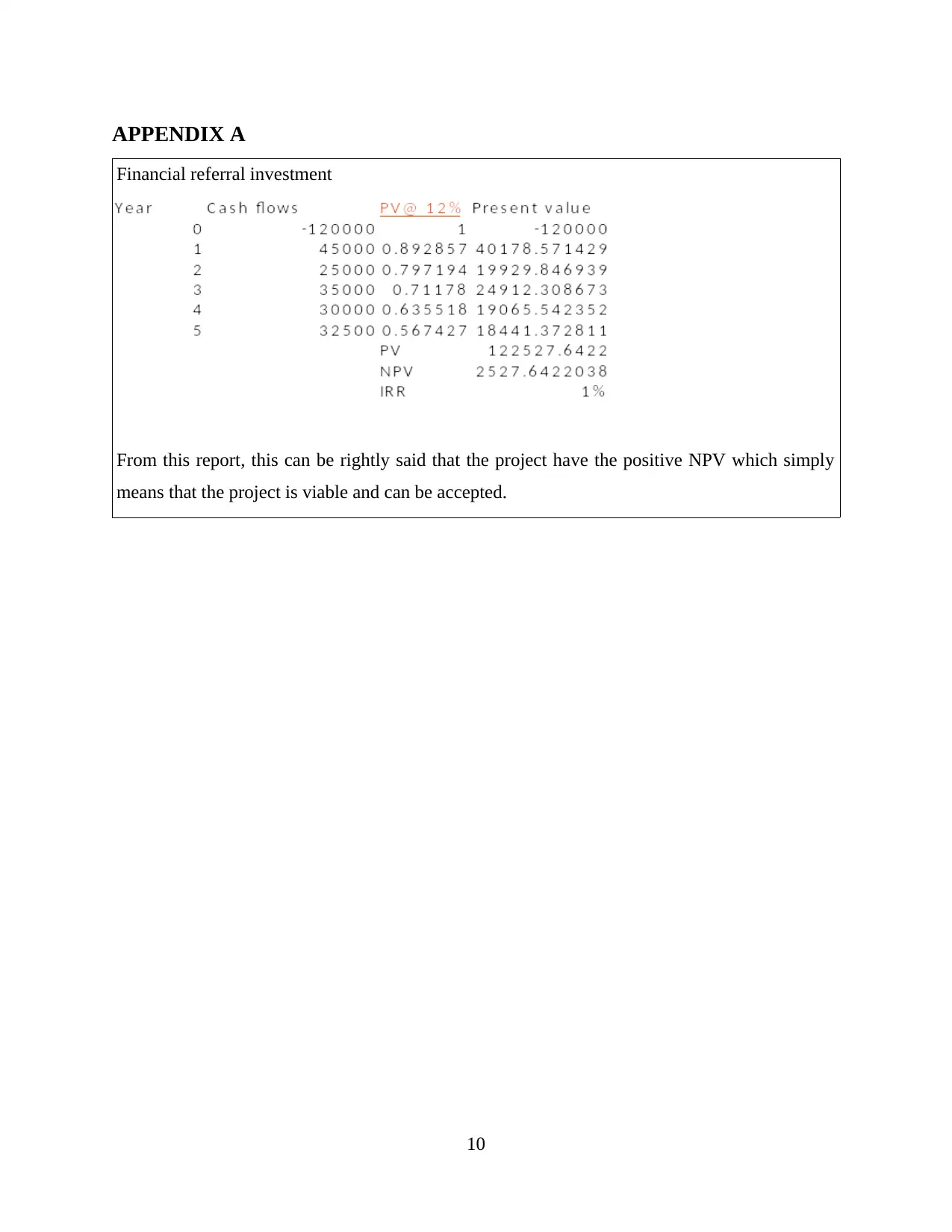
APPENDIX A
Financial referral investment
From this report, this can be rightly said that the project have the positive NPV which simply
means that the project is viable and can be accepted.
10
Financial referral investment
From this report, this can be rightly said that the project have the positive NPV which simply
means that the project is viable and can be accepted.
10
1 out of 14
Related Documents
Your All-in-One AI-Powered Toolkit for Academic Success.
+13062052269
info@desklib.com
Available 24*7 on WhatsApp / Email
![[object Object]](/_next/static/media/star-bottom.7253800d.svg)
Unlock your academic potential
© 2024 | Zucol Services PVT LTD | All rights reserved.





